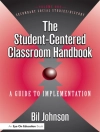Cooperative groups work to make each member a more successful student.
Compelling research conclusively proves that group learning increases students′ academic and social skills. Many teachers use cooperative groups in their classrooms, but they can be extremely difficult to implement and even harder to assess.
Assessing Students in Groups explains how to form productive groups and assess individual student performance in group work. David W. Johnson and Roger T. Johnson, prominent experts in cooperative learning, provide many practical resources that teachers can put to immediate use, including scoring sheets, observation forms, learning contracts, classroom activities, and questionnaires. Key concepts are clearly defined in each chapter and a comprehensive glossary is included.
This user-friendly and insightful guide includes chapters on:- When and where to use groups
- Making groups productive
- Developing an assessment plan for groups
- Assessing performances of individual group members
- Self-assessment in groups
- Peer assessment in groups
Designed for teachers, principals, and staff developers, Assessing Students in Groups is also an essential resource for district and state-level administrators and pre-service teachers.
Daftar Isi
Series Editors′ Introduction
Preface
About the Author
1. The Power of Cooperative Groups
2. Structuring Productive Groups
3. Developing an Assessment Plan for Groups
4. Using Groups for Individual Assessment
5. Assessing Groups as a Whole
6. Incorporating Peer Assessment in Groups
7. Cultivating Self-Assessment in Groups
8. Designing Group Experiences for Assessment
9. Putting It All Together
References
Index
Tentang Penulis
Roger T. Johnson is a professor of curriculum and instruction at the University of Minnesota. He holds his doctoral degree from the University of California in Berkeley. He is the Co-Director of the Cooperative Learning Center. His public school teaching experience includes kindergarten through eighth grade instruction in self-contained classrooms, open schools, nongraded situations, cottage schools, and departmentalized (science) schools. He has consulted with schools throughout the world. He taught in the Harvard-Newton Intern Program as a master teacher. He was a curriculum developer with the Elementary Science Study in the Educational Development Center at Harvard University. For three summers, he taught classes in the British Primary Schools at the University of Sussex near Brighton, England. He has been honored with national awards from numerous organizations. He is the author of numerous research articles, book chapters, and books.












